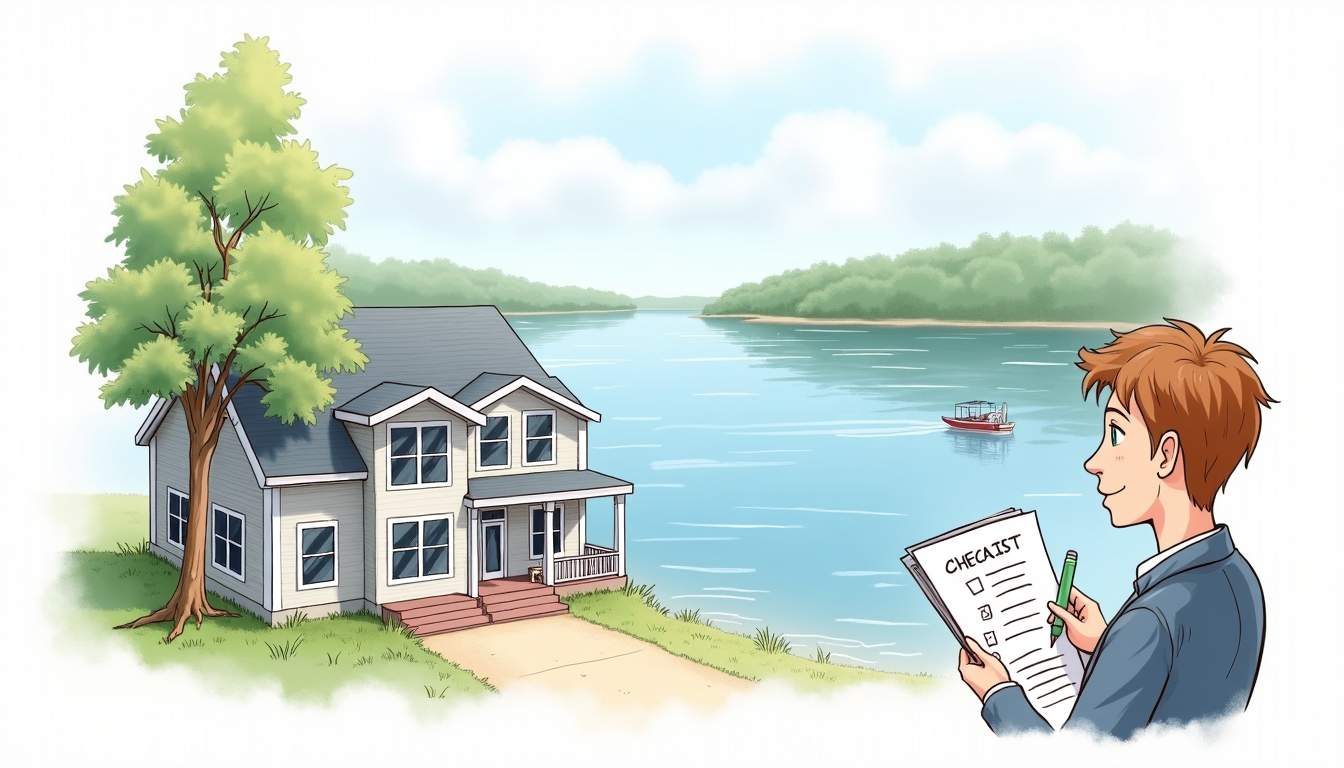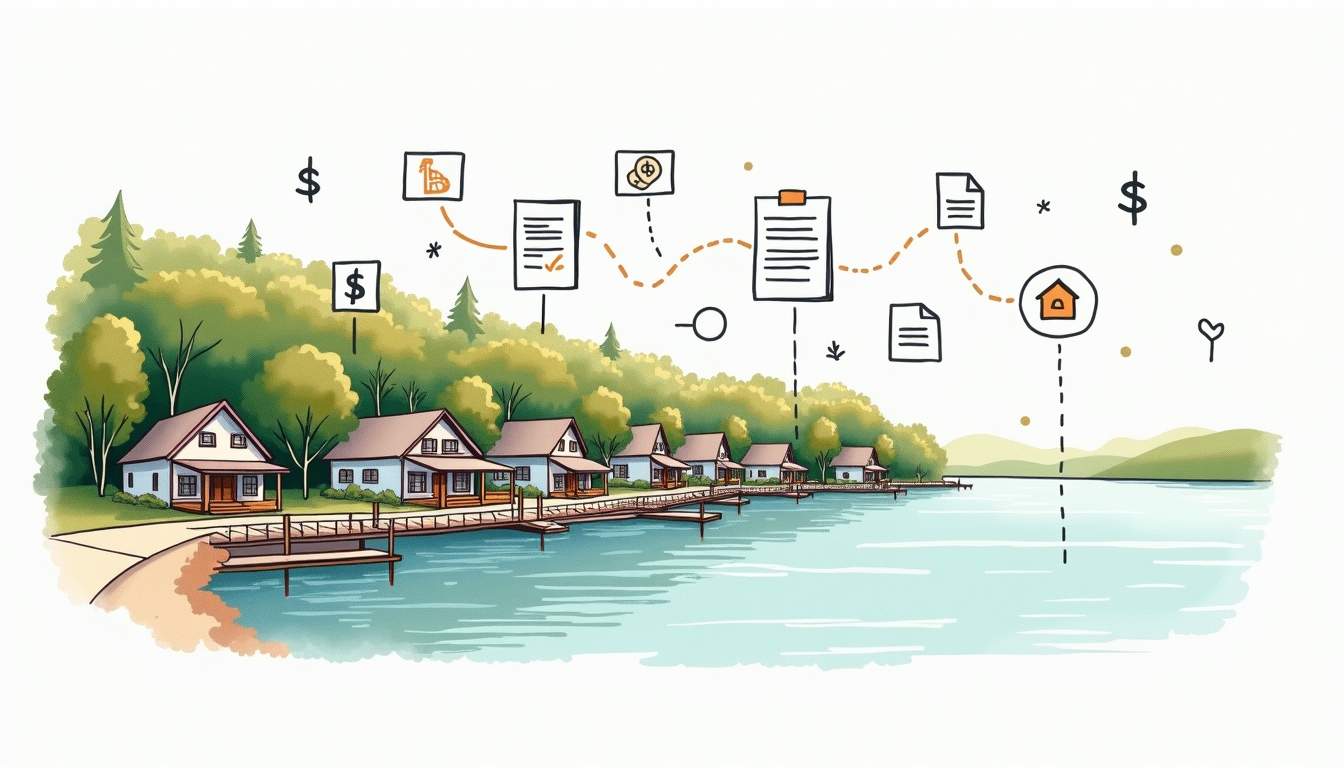
From the rolling foothills of the Cumberland Plateau to the wide, placid surfaces of Tennessee's lakes and rivers, waterfront property in the Volunteer State offers a rare blend of natural beauty, recreational opportunity, and investment potential. This article explores standout waterfront markets across Tennessee, highlights current types of listings buyers are finding, and offers practical tips to navigate the unique considerations of purchasing waterfront real estate.
Waterfront homes and cabins attract buyers for predictable reasons: views, access to boating and fishing, and the sense of privacy that water-adjacent lots often provide. In Tennessee, these benefits are amplified by the state's mild seasons, numerous public access points for outdoor recreation, and popular lakes such as Norris, Douglas, and Percy Priest.
Beyond lifestyle appeal, waterfront property is often seen as a hedge against typical market fluctuations. Scarcity of true water frontage, plus steady interest from retirees, vacationers, and investors, keeps demand relatively resilient. That said, price movement varies by location, amenities, and the absence or presence of development restrictions.
Additionally, Tennessee's strategic location in the southeastern United States makes it an attractive destination for those looking to escape crowded urban centers while still maintaining convenient access to major cities like Nashville, Knoxville, and Chattanooga. The state’s infrastructure improvements and growing economy have further increased the appeal of waterfront properties, enhancing their value and desirability. Recreational options are abundant, ranging from hiking trails near the lakes to seasonal festivals that celebrate local culture, providing year-round engagement for residents.
Furthermore, environmental conservation efforts in Tennessee have helped preserve many waterfront areas in their natural state, adding to the scenic and ecological appeal of these properties. Many buyers are drawn not only by the recreational benefits but also by opportunities to connect with nature through birdwatching, kayaking, or simply enjoying the serene surroundings. This combination of natural beauty, outdoor activities, and community investment in maintaining water quality continues to drive demand among diverse groups of property seekers.
Several lakes and riverfront communities consistently attract buyers. Each market has its own character and price dynamics, so it helps to know what distinguishes them.
Norris Lake's long shoreline and clear water make it a favorite for boating and fishing. Properties range from rustic cabins tucked in coves to modern homes with private docks. The market sees steady interest from buyers seeking vacation rentals and second homes since many lots are located near marinas and public boat ramps.
Families and water sports enthusiasts gravitate toward Douglas Lake for its expansive coves and slower-paced developments. Real estate often includes deeper lots suitable for large docks and multiple watercraft, making it popular for buyers who value substantial private shoreline and easy water entry.
Closer to the Greater Nashville market, Percy Priest and Old Hickory lakes offer convenience. These spots are ideal for buyers who want waterfront living without sacrificing access to city amenities. Prices can be higher due to proximity to metropolitan job centers and entertainment.
For buyers seeking a more pastoral or recreational setting, the Kentucky Lake region and Land Between the Lakes provide vast waterways, public lands, and a slower pace. Properties here appeal to hunters, fishermen, and those wanting significant buffer from neighbors.
Waterfront listings in Tennessee can generally be categorized into several types: raw lakeshore lots, renovated cabins, modern homes with full amenities, and multi-unit or investment properties. Each carries its own considerations regarding price, maintenance, and permissible use.
Undeveloped lakeshore lots are attractive to buyers who want to build a custom retreat but require patience and additional investment. Expect to account for shoreline permits, erosion control, septic systems, and potential driveway or utility extension costs. A thorough site assessment and soil testing are critical before purchase.
Many hardwood-shaded coves host older cabins that have been updated. These properties often appeal to buyers seeking charm and proximity to water with less upfront construction hassle. Nonetheless, older structures can harbor deferred maintenance issues—roofing, piers, and foundational settling are common items to inspect carefully.
High-end buyers will find custom-built homes with boathouses, lifts, and expansive decks. These listings command premium prices and typically come with professional landscaping, advanced septic systems, and sometimes private access roads. Resale value tends to be strong for well-maintained, high-amenity properties.
Airbnb-style short-term rentals and multi-cabin parcels can provide robust income streams in popular lake areas. Local zoning, HOA rules, and county short-term rental regulations must be verified before acquiring an investment property. Operational logistics—management, utilities, and insurance—affect profitability and should be modeled ahead of purchase.
Waterfront ownership introduces variables not typically encountered in standard residential transactions. Some are legal, some are environmental, and some are practical. Addressing these in advance protects both enjoyment and value.

Understanding exactly what land comes with the property is foundational. Some lots include a fixed shoreline boundary, while others involve easements or shared coves. Confirm whether the sale includes riparian rights, which affect dock placement, water access, and riparian vegetation management.
Building or updating docks and boathouses typically requires permits from state agencies and possibly the Army Corps of Engineers. Dimensions, placement, and environmental impact are scrutinized. Verify current local and state regulations early in the buying process to avoid surprises or denied permits.
Even lakeside property can face fluctuating water levels and erosion. Obtain elevation certificates and shoreline surveys, and review historical high-water marks if available. Consider resilient landscaping, rock riprap, or professionally designed erosion controls when planning improvements.
Many waterfront parcels rely on septic systems and wells. Inspections should include soil percolation tests and flow assessments for existing septic. Additionally, check for reliable power and broadband options—especially important for remote cabins being used as rentals or remote-work residences.
Lenders and insurers view waterfront homes differently than typical properties. Loan qualification, interest rates, and coverage options can vary based on elevation, history of flooding, and the type of property.

Conventional loans, FHA, and VA programs are available, but approval often depends on accurate property appraisals and confirmation that the home meets livability standards. Undeveloped lots or properties with aging infrastructure may require construction loans or higher down payments.
Flood insurance is often required for properties in flood-prone zones, and premium costs can be significant. Even if a property isn't in a federally designated flood zone, private flood risk assessments may recommend coverage. Windstorm and comprehensive homeowner policies should be compared for any exclusions related to piers or boathouses.
Timing and preparation can yield favorable terms when pursuing waterfront deals. Sellers of seasonal or under-utilized properties may entertain creative offers, and off-season buying can sometimes reduce competition.
Markets often heat up in spring and summer when buyers can inspect water conditions and enjoy a property firsthand. Exploring listings in the off-season can reveal motivated sellers and fewer bidding wars. Keep research ongoing year-round to identify trends and inventory shifts.
Waterfront transactions should include clear contingencies for structural, environmental, and permitting hazards. Allow time in offers for dock inspections, shoreline surveys, and confirmation that desired improvements are permitted under local ordinances.
Teaming with real estate agents, surveyors, and attorneys experienced in shoreline matters is invaluable. These professionals can anticipate red flags, help secure necessary permits, and navigate title questions related to easements, which often complicate waterfront deeds.
Owning waterfront property is both a luxury and a responsibility. Long-term enjoyment hinges on proactive maintenance and mindful stewardship of the shoreline and surrounding habitat.
Scheduling routine inspections for docks, seawalls, and erosion control systems minimizes emergency repairs. Seasonal tasks include winterizing water systems, treating mildew-prone exterior surfaces, and clearing debris from storm events to protect pilings and boat lifts.
To prevent erosion while enhancing wildlife habitat, favor native grasses, shrubs, and trees along the shoreline. Where hard structures are necessary, combine them with vegetative buffers to filter runoff and reduce ecological impact. Local extension services and conservation districts can provide region-appropriate recommendations.
Consider parking, septic capacity for guests, and dock safety when entertaining or renting. Clear signage, proper lighting, and adequate waste management improve the guest experience and reduce liability. For short-term rentals, a reliable local property manager can handle turnovers and maintenance efficiently.
Waterfront real estate in Tennessee offers a compelling mix of leisure and long-term value, but it requires careful due diligence. Assessing shoreline rights, understanding permitting requirements, and preparing for maintenance and insurance costs are essential steps in securing a waterfront property that meets both personal and financial goals.

Whether pursuing a vacation cabin on a quiet cove or a full-time residence near Nashville's lakes, informed choices, thoughtful negotiations, and partnerships with experienced local professionals make the difference between a stressful purchase and a rewarding waterfront lifestyle.
Ready to embrace the waterfront lifestyle in a luxury gated community? Tennessee National offers exceptional living with stunning waterfront views, a Greg Norman Signature Golf Course, private marina, and over 20 exclusive amenities designed for relaxation and recreation. Whether you desire a move-in ready home or a custom build, our community blends natural beauty with resort-style living. Schedule a Private Tour today and start making memories in Tennessee National’s breathtaking setting.